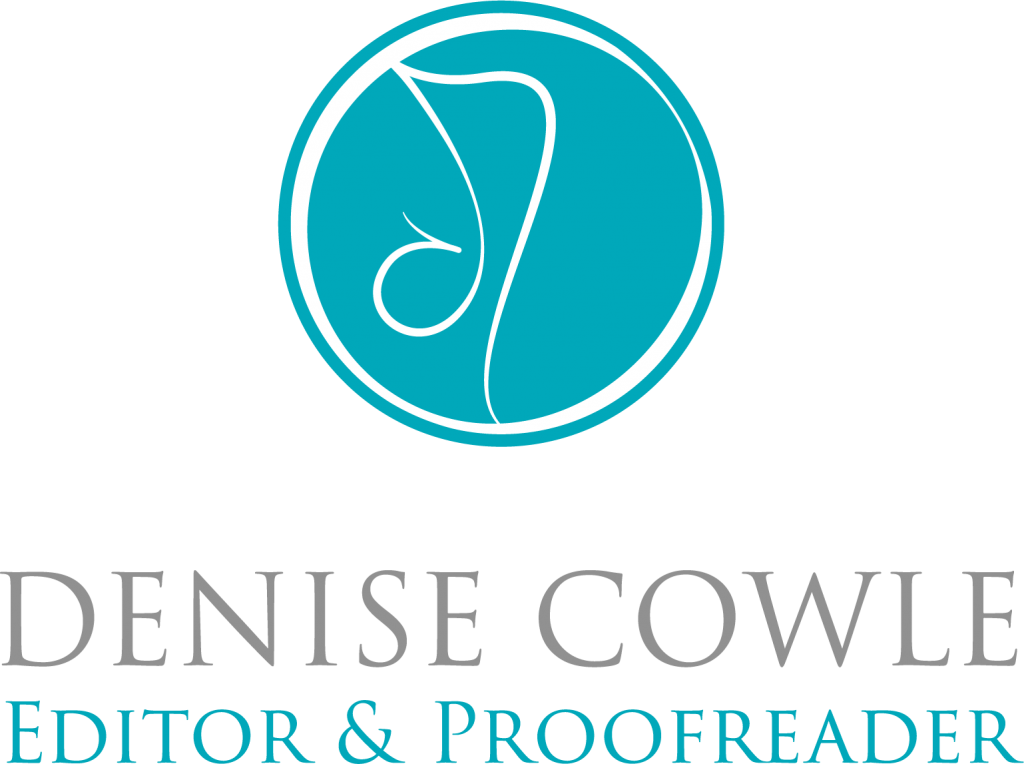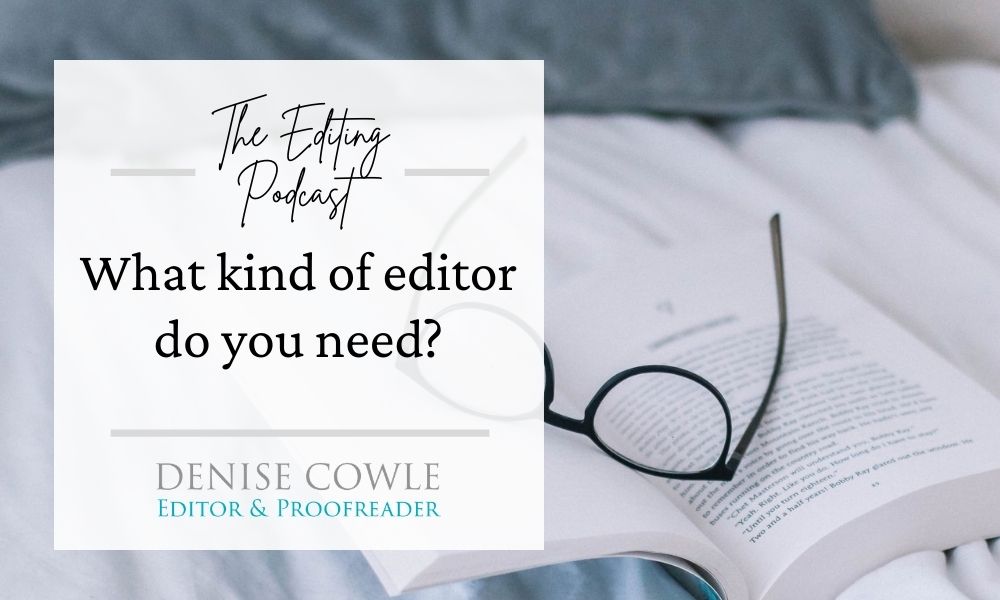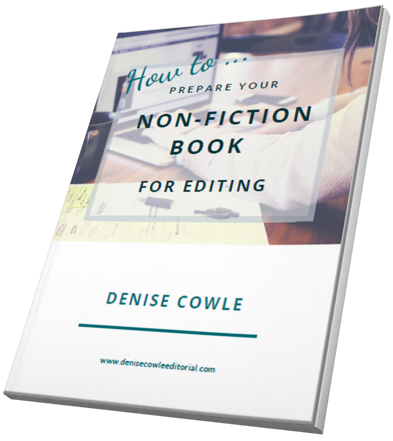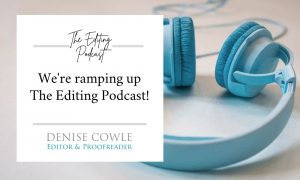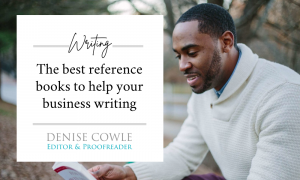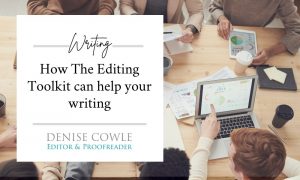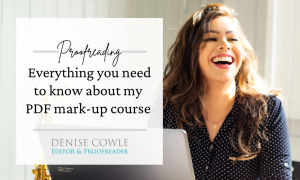In this week’s episode, Louise and I take a look at what kind of editor you might need.
What influences the decision to hire an editor?
Denise Cowle: Hello and welcome to Episode 5. So this week we’re talking about choosing the right kind of editor to suit your publishing needs. Now, in Episode 1 we did an overview of the different levels of editing, so if you’re unsure about those, we’d recommend you listen to that just to clarify things.
Louise Harnby: Definitely. So the kinds of things that will influence your decision are:
- What your budget is – might you use friends or fellow writing-group members to help you out with final proofreads or structural work?
- What your expertise is
- What level of editing you feel comfortable doing yourself and what you need help with
- What your genre or subject focus is
- The kind of personality fit you’re looking for
- The time frame you want the job turned around in
- What your publishing goals are: are you working with an agent, or doing it yourself?
- Who you audience is
Where should you spend your editing budget?
DC: There’s actually quite a lot to think about there! But let’s put that to one side for a minute and talk about money. And, yes, we know that professional editors have a tendency to say you should take your book through every single stage of editing, but we’re not daft. The reality is that some writers are going to have to make some really tough decisions about budget, especially if they’re self-publishing.
LH: I think that’s particularly true in the indie fiction market. If you’re self-publishing, say, a romance or a thriller, the market’s really noisy. And so it might take you longer to get a return on your investment because, ultimately, you’re writing something that entertains first and foremost. So one thing you can do is think about what other resources you have to hand.
So if you’ve studied story craft (either through books or classes or a writing group) you might decide that you won’t invest in a full developmental edit but you’ll get a critique instead. Now that’s a really specialist service in the fiction editing market and it gives you an overview of how your story’s working at the macro level. And rather than editing the text, the author gets a report. It’s more work for you as the author but it’s cheaper too!
DC: That point you made about entertainment is interesting because if you’re publishing
non-fiction, and you’re writing for a niche market, you might well be providing something that’s less entertainment and more educational. So for example, if you’re a marketer, and you’ve written a book that helps people learn how to be visible, and you’ve already got a platform because of your job, you might be able to sell your book more quickly. And that will give you more confidence in investing in editing, knowing you’re going to get that return.
non-fiction, and you’re writing for a niche market, you might well be providing something that’s less entertainment and more educational. So for example, if you’re a marketer, and you’ve written a book that helps people learn how to be visible, and you’ve already got a platform because of your job, you might be able to sell your book more quickly. And that will give you more confidence in investing in editing, knowing you’re going to get that return.
LH: That’s exactly like Andrew and Pete – for you listeners, they’re two professional
marketers that me and Denise know. They’re really well known in their field, so when they launched their books, The HippoCampus and Content Mavericks, they were already confident that they could sell a lot of those quickly because they were already known and trusted. So they knew that anything they spent on editing was going to be a good investment.
marketers that me and Denise know. They’re really well known in their field, so when they launched their books, The HippoCampus and Content Mavericks, they were already confident that they could sell a lot of those quickly because they were already known and trusted. So they knew that anything they spent on editing was going to be a good investment.
Where does your own expertise lie?
DC: Yes, and that’s a really good example of the expertise issue. So when you’re writing
business or educational materials, and if you’ve got an academic background, you’ll already know how that material needs to be structured, so perhaps you’ll be more confident about NOT working with a developmental editor; maybe you’ll decide to focus on investing in copyediting that corrects the text. Or perhaps – and I think this would apply to fiction as well – maybe you know you have a really strong command of English language and grammar so you might feel you would benefit from a professional proofread rather than a full copyedit.
business or educational materials, and if you’ve got an academic background, you’ll already know how that material needs to be structured, so perhaps you’ll be more confident about NOT working with a developmental editor; maybe you’ll decide to focus on investing in copyediting that corrects the text. Or perhaps – and I think this would apply to fiction as well – maybe you know you have a really strong command of English language and grammar so you might feel you would benefit from a professional proofread rather than a full copyedit.
LH: Yes, and one thing I notice with some indie author fiction writing is that some authors are confident about their grammar and punctuation but they know they overwrite, or they tend towards repetition, and so they want a pro line edit but then get a friend or a member of their writing group to do the final proofread.
DC: I think that’s a really good point – it’s about knowing what you’re comfortable doing as a writer – so understanding your strengths and weaknesses. Some editors offer mini line edits – I think you do for fiction, don’t you, Louise?
LH: Yes, for 10,000 words. So the idea is that a writer can see what kinds of problems I’m finding at sentence level, and how I’m editing to smooth the text, and then they can mimic me. Do you do that for non-fiction, Denise – do you think there’s a market for it?
DC: You know, that’s not something I offer at the moment, but I think it’s a really good idea. I don’t see why non-fiction writers wouldn’t benefit from this approach – I mean, plenty of people are on a tight budget and would love some guidance on where they can tighten up their writing. Sometimes all you need is for someone to point out an error so you can stop making it, and who doesn’t have a favourite word that they overuse, eh, Louise?
Do you need a specialist editor?
LH: Shall we talk about genre and subject now? Because something I’ve been asked a few times is whether a writer must work with someone who’s a specialist in a particular field. So in fiction, I don’t think it’s necessarily essential. I know quite a lot of fiction editors who work across genres, though many of us do have specialist bents. So around 90% of my work is in crime fiction, thrillers, mystery – that kind of stuff – and that’s definitely a specialism for me. I know an editor who specializes in romance, another in speculative fiction. And this can be an advantage in the sense that the writer is working with someone who’s familiar with the tropes and conventions in that genre, and what kind of literary devices might work best. How about in non-fiction?
DC: Well, I think it depends. So there are some subjects where I think authors are definitely better off working with a particular specialist editor. So legal, medical and scientific writing come to mind. Or perhaps if someone’s a social science specialist, it can help because a specialist editor is used to the language, or the culture of the language that those writers use. And they might spot mistakes that non-specialists wouldn’t.
It also depends on the intended audience. So some writers are aiming their book at nonspecialists, and they’re keen to ensure the books are really accessible to the lay person, so it’s not so much that the editor needs to be a specialist themselves, but more that they’re able to edit with an educational but accessible tone in mind. Sometimes we can forget how much we know about a subject and make assumptions about what others will know – it’s called the curse of knowledge! So your editor will be thinking about things like using plain language rather than jargon, and pitching the language at the right level for the intended reader.
Personality matters!
LH: So I’m wondering whether personality comes into play here too. So I know I’m a bit on the oversensitive side of things – I cry at adverts, and get weepy in airports. And I used to feel a bit embarrassed about that, but actually I think it’s fed really well in to my fiction editing because it helps me really immerse myself in the world an author’s built. Whereas an editor who really excels in editing business books might struggle to line edit crime fiction. I guess what I’m saying here is that I do think that even if a writer doesn’t focus specifically on genre or subject specialism, I think it’s worth them thinking about whether they should hire a specialist non-fiction or fiction editor. I think that could be an advantage.
DC: I think that’s a really interesting point. Although I love reading all sorts of fiction, from literary to crime to horror and supernatural, I don’t think I’ve got the temperament to edit it. I much prefer to deal with facts!
Consider your schedule (and the editor’s!)
LH: Not that you’re saying I’m a bit of a snake with the truth, I hope! Right. Shall we talk about time frame now, because some writers definitely need to the kind of editor who specializes in quick turnarounds. I get a lot of enquires from authors who want a quick turnaround because they’re hoping to get their fiction out in time for Christmas or for some big convention or writing event. But sometimes it’s just because they’re ready to get going now. Because of the length of the project it’s not usually possible to help someone who isn’t booking well in advance. But what’s the situation for non-fiction?
DC: Well, it really depends on the material. So I can turn around a few thousand words at short notice, like say a business report, but a full-length book comes with the same issues that you face. But you’re right – there are editors who specialise in short turnaround. What I would say is that if a writer wants something done quickly, I mean really quickly, something might have to give. If you want something done that means the editor’s going to have to work outside of their normal hours, that’s going to cost more.
LH: Yes, and the alternative is that you ask them to do a rush job on a budget – that’s going to affect quality. You can’t have it all ways.
DC: Yes, there’s fast, there’s cheap and there’s quality. I always say, ‘Pick two!’
What is your publishing process?
LH: Yes, I like that! I really like that! We should talk about publishing process now because I think writers need to be careful about choosing the right kind of editor depending on how they’re publishing. This came up at the FutureBook Live conference I was at in London last year – this issue of understanding your goals. So I’ve had authors ask me for a final proofread when they’re submitting to agents. And my advice is that an agent is not going to reject a book because of a few typos here and there. What they’re going to be looking at is a great story that hangs together well and is readable. So choosing a developmental or line editor is going to be a much better fit and a better investment than a proofreader.
DC: And I’ve had authors come to me who are submitting business books direct to
publishers, when the publishers they’re hoping to work with include editing and proofreading as part of their service. So it’s really important to work out what’s on offer from the people you’re publishing through.
publishers, when the publishers they’re hoping to work with include editing and proofreading as part of their service. So it’s really important to work out what’s on offer from the people you’re publishing through.
LH: Yes, and If you’re doing it all yourself you’re back to the other things we’ve already
talked about – working out where your writing and self-editing strengths and weaknesses lie. So let’s talk about audience – that will definitely determine what kind of editor you use.
talked about – working out where your writing and self-editing strengths and weaknesses lie. So let’s talk about audience – that will definitely determine what kind of editor you use.
Who is your audience?
DC: That’s right. So if you’re publishing a family memoir and it’s just a lovely thing you’re
creating for friends and family, a way of passing down your family history, you might decide that good enough is enough. You might get a copyedit to sort out your spelling, grammar and punctuation, and make sure everything’s consistent and readable, but you’re not going to be worried about whether it’ll get five stars on Amazon because you’re not putting it out there. Or you might just decide to do everything yourself.
creating for friends and family, a way of passing down your family history, you might decide that good enough is enough. You might get a copyedit to sort out your spelling, grammar and punctuation, and make sure everything’s consistent and readable, but you’re not going to be worried about whether it’ll get five stars on Amazon because you’re not putting it out there. Or you might just decide to do everything yourself.
LH: I think that’s a really good point. And the reviews thing is certainly going to be an issue if you are putting it out to the general public. I have a regular author who published ten books on Amazon before he came to me. And people loved his stories – because he’s a great worldbuilder and a really good self-structural editor – but he was getting Amazon stars knocked off and grumpy reviews because of the sentence-level mistakes. So that’s how I ended up with his back catalogue! And he absolutely knew he needed a copy-editor because his audience was demanding it.
DC: And that’s a good reminder that it’s never too late to work with an editor or to do your own editing.
LH: Yeah, that really is the beauty of publishing in the 21st century. Digital publishing has really democratised things and given everyone the opportunity to make informed decisions, not just about who they want to work with but how they want to publish.
To summarise …
DC: Yes. So let’s wrap up with a quick overview. When you’re deciding what kind of editor to work with, think about your budget and who else around you might be capable of taking on some parts of the editing process. But also your own experience and skills – your strengths and weaknesses.
LH: Ask yourself whether you want to work with a specialist fiction or non-fiction editor, or even someone who has sub-specialist experience in terms of genre or subject, and whether you want an editor who’s a particular personality type.
DC: Consider time frame – and what the implications are for the quality of the work and the cost.
LH: And also, who your publishing partners are – agent or publisher for instance – and what that they’ll expect to do for you, and what you’ll need to do yourself.
DC: And, finally, think about your audience and what their expectations are. And now it’s
time for Editing Bites! This is our weekly feature where we each recommend a tool or
resource for you. What have you got for us this week, Louise?
time for Editing Bites! This is our weekly feature where we each recommend a tool or
resource for you. What have you got for us this week, Louise?
Editing Bites: resources for writers
LH: So my Editing Bite for this week is the wonderful Joel Friedlander’s Self-Publishing: Carnival of the Indies, which he hosts on his Book Designer website. So each month, Joel publishes a list of links to blog articles written by editors and writers, and for indie authors. There’s stuff on writing tools and tips, book design and production, marketing and selling your books, ebooks and ebook readers, and how to achieve self-publishing success. What about you?
DC: And mine is Tim Lewis’s Begin Self-Publishing Podcast. Tim takes you through how to self-publish your eBook onto Amazon, Apple and the other global ebook stores, how to market a book, and general online business techniques needed to be a successful self publisher. There are well over 100 episodes to listen to, and Louise and I have both been guests – check out episodes 104 and 108!
LH: Yes, Tim’s so lovely! His was the first guest podcast interview I ever did and he really
put me at ease. Thanks, Tim – you’re a star! THe other thing I should mention is that he also interviews authors, so you get really good insights from other writers.
put me at ease. Thanks, Tim – you’re a star! THe other thing I should mention is that he also interviews authors, so you get really good insights from other writers.
That’s all for this week. Thank you so much for listening to The Editing Podcast. You can rate, review and subscribe via your podcatcher.
Ask us a question
The easiest way to ping us a question is via Facebook Messenger: Visit the podcast’s Facebook page and click on the SEND MESSAGE button.
